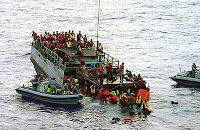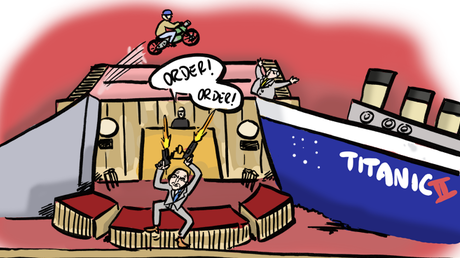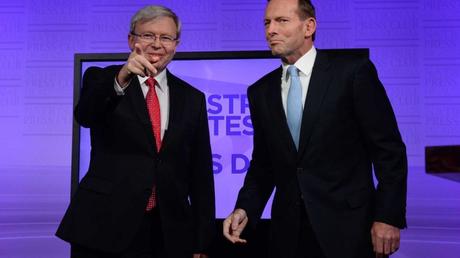
When Kevin Rudd won the 2007 election, the received wisdom was that he owed his success to being more like John Howard than Howard himself. In unveiling his latest response to the problem that irregular boat arrivals pose to his election prospects, he has proven himself as skilful as his predecessor at producing radical solutions to difficult electoral problems.
In 2001, confronted by almost certain electoral defeat by the opposition Labor Party led by Kim Beazley, Mr Howard seized the opportunity presented by the arrival in Australian waters of the Norwegian vessel MV Tampa. Determined not to allow the 438 rescued asylum-seekers on board reach Australian soil, he dispatched his foreign minister, Alexander Downer, to find a country that would agree to detain them while their asylum claims were processed. Of the numerous Pacific island countries that he approached, only Australia’s two former colonies, Nauru and Papua New Guinea (PNG), agreed to this unprecedented request. Mr Howard’s electoral standing rebounded and he went on to win the 2001 election.
Mr Rudd has unveiled a response to the electoral problem of irregular boat arrivals that surpasses in its audacity the initial 2001 ‘Pacific solution’.
In 2013, confronted by almost certain electoral defeat by the Coalition, Mr Rudd has unveiled a response to the electoral problem of irregular boat arrivals that surpasses in its audacity the initial 2001 ‘Pacific solution’. Asylum-seekers will not only be detained in PNG while their claims are processed, but those whose claims are successful will be resettled in PNG. In exchange for this service, Australia will provide PNG with substantial benefits, the details of which are as yet imprecise but appear to include funding for universities, hospitals and law and order, on top of the cost of upgrading the existing detention centre on Manus Island and refugees’ resettlement.
No-one with even a passing familiarity with PNG could imagine that it can provide suitable places for refugees to settle. Its overwhelmingly rural Melanesian society is comprised of more than 800 language groups and underpinned by customary land ownership. Outsiders like the resettled refugees cannot simply join such a culture but, lacking access to land, will have to find homes in PNG’s cities. Presumably neither government will agree to their living in the widespread informal or illegal settlements, and they will need to be housed in the formal rental market. The going rate for an apartment in Port Moresby begins at over $1,000 per week and rises to many times that.
Beyond such basic problems, it is unclear whether resettled refugees will be allowed to work or eventually acquire PNG citizenship. Whereas most boat arrivals who passed through the first ‘Pacific solution’ now live in Australia as permanent residents or naturalised citizens, the current measure explicitly excludes any pathway to such an outcome. No doubt, politicians both north and south of Torres Strait are counting on its acting as an effective deterrent, which would limit its final cost. Nonetheless, the Australian government may have signed up to pay the cost of living for settled refugees in perpetuity.
A second set of likely ongoing effects of this agreement concerns Australia’s relationship with PNG. Pacific islanders are acutely aware of the ways that Australia uses the leverage of its aid to achieve its own objectives. The language of partnership notwithstanding, the agreement does nothing to address PNG’s own issues with refugees from neighbouring Indonesian-controlled West Papua. Rather, the way in which the Rudd government is perceived to have acted will reinforce the image of Australia as a bully and undermine the good work that Australia does in PNG.
In conclusion, the latest version of the ‘Pacific solution’ exhibits the most problematic aspects of its earlier iterations. It subordinates a coherent vision for handling irregular boat arrivals and Australia’s relationship with PNG to the immediate electoral interests of the Rudd government. Whether it succeeds or not, it has established further precedents for Australian policy in both these domains.




